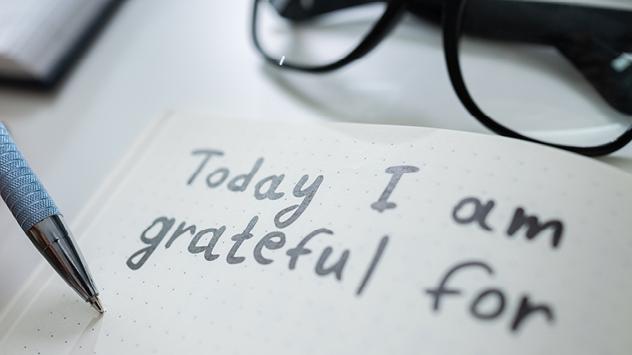As we head into the season of gratitude and thanksgiving, let’s acknowledge something – our moms were right, again. Being grateful about what we have and acknowledging it does wonderful things for our physical and mental wellbeing.
“If you're thinking, which people typically are, about good things when they are expressing gratitude, then it seems to be a real easy, effective way to feel better about yourself,” says Dr. Patrick Carroll, an associate professor of psychology at Ohio State Lima who has been studying the mechanics of gratitude and its effects.
The history of gratitude stretches far back in human history. The Roman orator Cicero called gratitude the ultimate virtue that the other virtues stem from. While being grateful is clearly not a new thing, it began to pick up steam with the introduction of the study of positive psychology during the 20th century. When researchers began adding studies about the positive side of human nature, gratitude moved more firmly into the spotlight.
Today, Dr. Carroll and his colleagues are studying how gratitude ties into confidence and self-validation and whether the boost that comes from gratitude can transfer to other areas.
Preliminary results say that yes, gratitude can strengthen your confidence in other areas. The tricky part is that those feelings of confidence don’t care whether they are applied to something negative or positive.
Much like going food shopping when you’re hungry can have less desirable effects, having negative thoughts in your mind while expressing gratitude can dampen the boost to your wellbeing.
“Overall the story is that feeling grateful and expressing it is a good thing, but it can have unintended effects. For example, when you're thinking of something negative, but 9 times out of 10 it's going to be a good thing,” Carroll says. “Expressing gratitude doesn't cost any money and writing down five things that you are grateful for each day doesn't take you a lot of time so it’s cost effective."
The positive glow of gratitude extends at least within the situation you are experiencing when expressing it. For those who practice gratitude on a regular and consistent basis, the positive effects can go even further.
“If you express gratitude even once in a setting, it is going to have effects throughout that setting. It's going to color the interaction going forward,” Carroll says. “If it is practiced over time, it snowballs almost to where it is pretty difficult to stop the glow.”
Carroll has several students working on the project as part of their undergraduate research projects. The experience has made them more cognizant of the importance of being thankful.
“I have found that the more gratitude I express, the more positive I feel, no matter the subject matter,” says Mackenzie Peterman, a junior in biology. “It has been interesting learning about this quality and investigating potential factors which may affect a person’s ability to feel gratitude, especially in the 21st century, where people are subject to many life stressors.”
Carroll is also curious about whether knowing that gratitude can have a positive effect will actually dampen the positive outcomes as it can with concepts like puffing out your chest to give yourself confidence.
“Unlike the focus on self involved in power posing, the idea that gratitude is typically focused outside the self may help to counteract this ‘dampening effect,’” Carroll says. “With gratitude, you're focused on others or even just writing it down to a general other, a notebook, your gratitude journal. This may enable you to experience the same confidence without attributing it to the expression of gratitude.”
Once they have finished their studies with gratitude, future projects for Carroll and his lab may extend to other virtues such as compassion, kindness and generosity.
